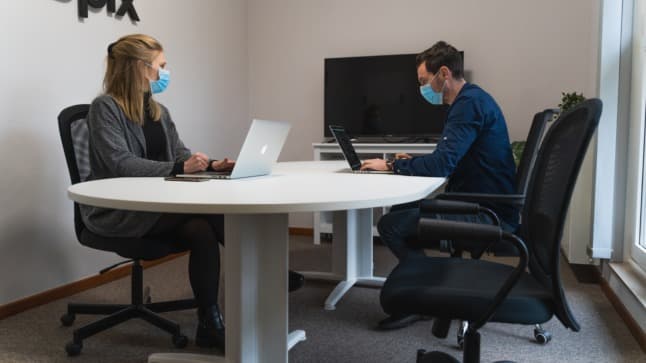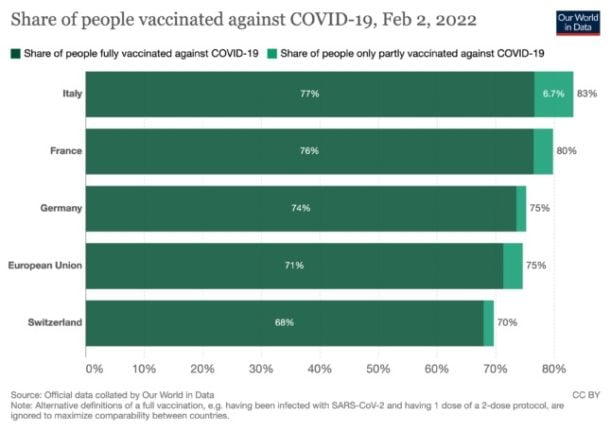Today in Switzerland: A round-up of the latest news on Friday

Find out what's going on today in Switzerland with The Local's short roundup of the news.
Some health experts ‘not optimistic’ about eased Covid restrictions
As the Federal Council lifted some measures this week, with more to be ended on February 17th, some experts call for caution and more patience.
"I'm not so optimistic. There are still a lot of cases right now. We know very well that most infections happen after the peak”, said Silvia Stringhini, head of the Population Epidemiology Unit at Geneva’s University Hospitals (HUG).
“The hospitals remain full and we have to wait a few weeks and allow a little more time to be sure we passed this wave”, she added.
READ MORE: Covid-19 infections: Has Switzerland reached the peak yet?
Switzerland still trails its neighbours in vaccination rate
While announcing the lifting of Covid measures this week, the government said a move is possible thanks to “high level of immunity among the population thanks to vaccination”.
However, in international comparison, Switzerland’s immunisation rate — 68.35 percent — is still below that of its neighbours’ as well as the European Union's average.

Within the country, rates vary widely from one canton to another, with more than 70 percent of the population fully vaccinated in Basel-City, Basel-Country, Graubünden, Neuchâtel, Ticino and Zurich.
By contrast, Appenzell-Innerrhoden and Schwyz (just over 56 and 59 percent respectively), have the lowest vaccination rates in the country.
Medical tests significantly more expensive in Switzerland
A comparative study of the costs of medical tests in France, Germany, the Netherlands and Switzerland shows — no surprise there — that Switzerland is most expensive.
The government’s price monitor analysed costs of commonly performed blood tests in each of the four countries and found that “all the Swiss prices are higher than abroad”.
And the difference in price is not exactly minimal: “In some cases, the differences are disproportionate. For example, a blood test is 31 times more expensive in a doctor's office in Switzerland than in Germany”.
The price monitor estimates that by aligning Swiss tariffs with the average level of costs in other countries, potential savings “would exceed one billion francs”.
This saving is all the more important as Swiss insurance companies predict a dramatic increase in health insurance premiums — 5.1 percent per person on average.
READ MORE: ‘Worrying’: Swiss health insurers warn of significant price increases
Future of employment: a mix of home-working and physical office
Now that the obligation to work from home has been lifted, will employees return to the office in droves?
Not necessarily. A number of major Swiss companies, including Roche, Novartis, Swisscom, retail chains Migros and Coop, as well several insurance companies, have said they are maintaining “a good mix” of distance and on-site work, at least for the time being.
Their plan is to "gradually increase face-to-face work" while maintaining "the ability to work from home as often as possible where it makes sense”, said a spokesperson for Helsana insurance.
If you have any questions about life in Switzerland, ideas for articles or news tips for The Local, please get in touch with us at [email protected]
Comments
See Also
Some health experts ‘not optimistic’ about eased Covid restrictions
As the Federal Council lifted some measures this week, with more to be ended on February 17th, some experts call for caution and more patience.
"I'm not so optimistic. There are still a lot of cases right now. We know very well that most infections happen after the peak”, said Silvia Stringhini, head of the Population Epidemiology Unit at Geneva’s University Hospitals (HUG).
“The hospitals remain full and we have to wait a few weeks and allow a little more time to be sure we passed this wave”, she added.
READ MORE: Covid-19 infections: Has Switzerland reached the peak yet?
Switzerland still trails its neighbours in vaccination rate
While announcing the lifting of Covid measures this week, the government said a move is possible thanks to “high level of immunity among the population thanks to vaccination”.
However, in international comparison, Switzerland’s immunisation rate — 68.35 percent — is still below that of its neighbours’ as well as the European Union's average.

Within the country, rates vary widely from one canton to another, with more than 70 percent of the population fully vaccinated in Basel-City, Basel-Country, Graubünden, Neuchâtel, Ticino and Zurich.
By contrast, Appenzell-Innerrhoden and Schwyz (just over 56 and 59 percent respectively), have the lowest vaccination rates in the country.
Medical tests significantly more expensive in Switzerland
A comparative study of the costs of medical tests in France, Germany, the Netherlands and Switzerland shows — no surprise there — that Switzerland is most expensive.
The government’s price monitor analysed costs of commonly performed blood tests in each of the four countries and found that “all the Swiss prices are higher than abroad”.
And the difference in price is not exactly minimal: “In some cases, the differences are disproportionate. For example, a blood test is 31 times more expensive in a doctor's office in Switzerland than in Germany”.
The price monitor estimates that by aligning Swiss tariffs with the average level of costs in other countries, potential savings “would exceed one billion francs”.
This saving is all the more important as Swiss insurance companies predict a dramatic increase in health insurance premiums — 5.1 percent per person on average.
READ MORE: ‘Worrying’: Swiss health insurers warn of significant price increases
Future of employment: a mix of home-working and physical office
Now that the obligation to work from home has been lifted, will employees return to the office in droves?
Not necessarily. A number of major Swiss companies, including Roche, Novartis, Swisscom, retail chains Migros and Coop, as well several insurance companies, have said they are maintaining “a good mix” of distance and on-site work, at least for the time being.
Their plan is to "gradually increase face-to-face work" while maintaining "the ability to work from home as often as possible where it makes sense”, said a spokesperson for Helsana insurance.
If you have any questions about life in Switzerland, ideas for articles or news tips for The Local, please get in touch with us at [email protected]
Join the conversation in our comments section below. Share your own views and experience and if you have a question or suggestion for our journalists then email us at [email protected].
Please keep comments civil, constructive and on topic – and make sure to read our terms of use before getting involved.
Please log in here to leave a comment.